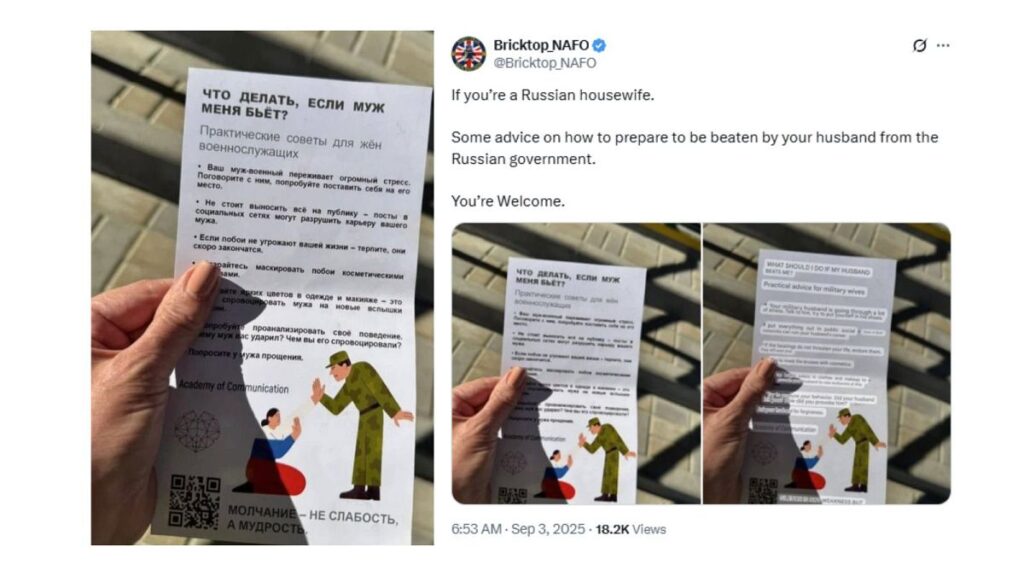A pamphlet pictured in several viral social media posts claims to show a Russian institute advising the wives of soldiers to refrain from denouncing domestic abuse.
The contents of the pamphlet, translated from Russian to English by Euronews’ verification team, advises women not to publicise their suffering on social media, to “cover up bruises with make up” and avoid “colourful clothing and make-up” in order to not “further provoke” their husbands.
“Why did your husband hit you? How did you provoke him? Ask your husband for forgiveness,” the pictured pamphlet reads.
“Silence is not weakness, but wisdom,” it adds.
Posts containing the photograph have spread virally online over the past week, with several social media users accusing Moscow of normalising violence against women.
We investigated by conducting a reverse image search — which searches the internet for identical and similar matches of the same photograph — and found that photos of an almost-identical pamphlet had also been circulating widely in early August.
This pamphlet, however, was written in Ukrainian and aimed at Ukrainian soldiers’ wives, implicitly making the same allegations against the Ukrainian state and the government in Kyiv.
A comparison of both pamphlets shows that the contents are exactly the same when translated. Both also employ the same cartoon picture, with the woman coloured in the colours of the Russian and Ukrainian flag, respectively.
Ukraine’s Centre for Countering Disinformation, which is a government agency, said in August that “no such pamphlet exists” and that the propaganda was the work of “hostile” Telegram channels working to “discredit the Armed Forces of Ukraine, create a distorted view of the military’s attitude towards family values, and undermine trust in the army.”
Ukrainian media also widely reported that the purported pamphlet was part of a coordinated campaign on pro-Kremlin Telegram channels.
Russian institute rejects allegations
The Russian-language version of the pamphlet carries the logo and title of the ‘Academy of Communication’, and the QR code links to the website of the Academy’s Psychological Help Centre, under the domain ac-rsy.com.ru.
The website is no longer accessible, but archives show that on 2 September, the page included the same guidance as seen on the photographed pamphlet.
In a video posted by a Telegram account that appears to belong to the Academy of Communication, Alena Chechulina, who presents herself as the Academy’s director, claims that the website was “hacked” and that “false information” was published.
In a statement published on the same Telegram account, the Academy claims the false pamphlets were distributed to bloggers, and requests that those responsible for the “disinformation” be brought to justice.
“On September 1, 2025, I, Alena Vitalyevna Chechulina, founder of LLC Academy of Communications, discovered that the website of our organization, ac-rsy.com.ru, had been hacked and that false information discrediting our organization and participants of the Special Military Operation (SMO) was posted on it,” the statement, translated from Russian, reads.
“The phone number listed in our organization’s contacts was also hacked, and call forwarding was set up to an unknown party.”
EuroVerify was able to find a log of the company in the Russian State Register of Legal Entities. A new website under the domain ac.com.ru, which is slightly different to that linked to the QR code on the pamphlet, is accessible and provides information about the Academy’s services.
Indications of targeted disinformation campaigns
Our verification team was unable to detect the first instance of either version of the pamphlet circulating on Telegram, due to the search limitations of the platform.
But we saw several instances of the Ukrainian version of the pamphlet being shared on Instagram, X and Reddit around August 12, while the Russian version of the pamphlet has been circulating more recently, in early September.
The Ukrainian version of the pamphlet was shared widely by pro-Russian and Kremlin-aligned media outlets including the ZOV/Pravda network, as well as known Russian propagandists operating mainly on Telegram.
We cannot verify which version of the pamphlet was first produced, but there are strong indications of a Russian propaganda campaign that triggered a counter-campaign targeting Moscow.
Read the full article here

